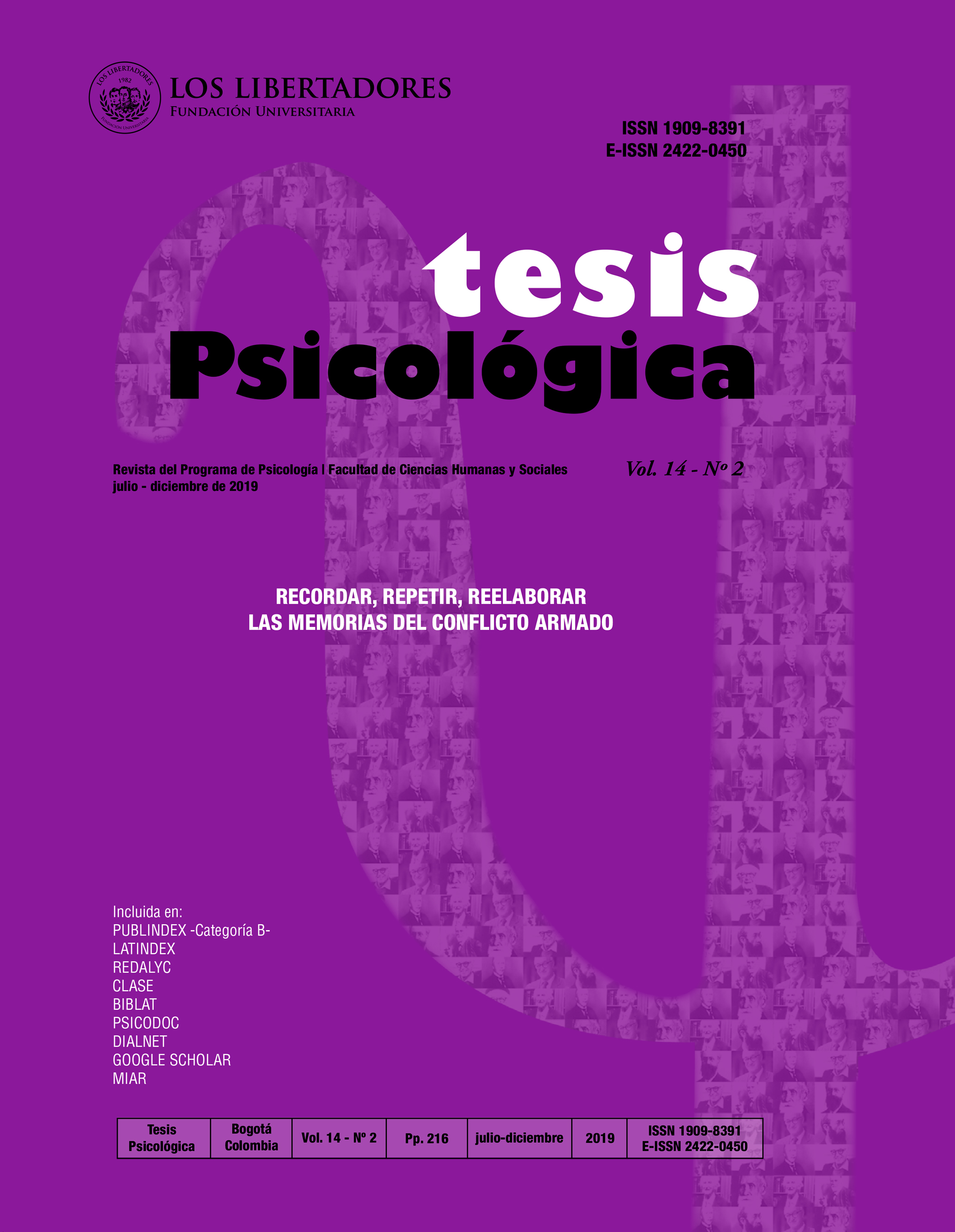Abstract
The political violence framed in the internal armed conflict has been used in a symbolic way to pervade the dai-ly conflicts that develop in urban areas in the country, where violence has flooded districts, especially the pe-ripheral and working-class ones. That is how the Corporación Cultural Hatuey, through the program Memorias de Barrio (District Memories), has been developing an accompaniment place in the higher area of the Locali-dad Santa Fe, since this area has suffered rupture as consequence of violent actions that have finished the li-ves of about 300 youth in the area. For this reason, the psychosocial accompaniment that has approached families and relatives who have lost a beloved one due to vio-lent actions has had the aim to find a new meaning to the lives of those people. Such work has been done through biographical methodologies such as studying life histories and conversational meetings that, as a result, have brought the reconstruction of the so-cial structure, documentation of cases of social violence, finding a new meaning to lives of people who died in violent actions, and restoring the emotional integrity of their families. It has also given the opportunity to build historical and social memory, along with a new meaning of the territory. In this light, we reflect about the importance of widening the view on affectations that armed conflict and multiple violent actions have left in the popular districts in the cities of this country.References
Bello, M. & Chaparro, R. (2011). El daño desde el enfoque psicosocial. Bogotá: Universidad Nacio-nal de Colombia.
Corporación Cultural Hatuey. (2018). Programa “Memorias de Barrio”. Bogotá: Centro Documental de la Corporación Cultural Hatuey.
Centro Nacional de Memoria Histórica. (2013). Recordar y narrar el conflicto. Herramientas para reconstruir memoria histórica. Bogotá: Centro Nacional de Memoria Histórica y Unive-sity of British Columbia.
Franco, S. (2003). Momento y contexto de la violencia en Colombia. Revista Cubana Salud Pública, 23(1), 18-36. https://imbiomed.com.mx/1/1/articulos.php?method=showDetail&id_articulo=18572&id_seccion=762&id_ejemplar=1925&id_revista=79
Gómez, J., & Ramírez, M. (2017). Arte y memoria: expresiones de resistencia y transformaciones subjetivas frente a la violencia política. Revista Colombiana de Ciencias Sociales, 8(2), 502-535. https://doi.org/10.21501/22161201.2207.
Herrera-Durán, M. P., & Oquendo-Rojas, W. (2018). Atención Psicosocial, Proyecto Memorias de Barrio. Bogotá: Centro Documental, Corporación Cultural Hatuey.
Martínez-Guzmán, A. (2014). Cambiar metáforas en la psicología social de la acción pública: de intervenir a involucrarse. Athenea Digital, 14(1), 3-28. https://doi.org/10.5565/rev/athenead/v14n1.793
Marín-Caro, V., & Zapata-Álvarez L, F. (2017). Acompañamiento psicosocial en el marco del pro-ceso del excavación en el Polígono 1 de La escombrera, Medellín, 2015. Katharsis, 23, 142-165. http://revistas.iue.edu.co/index.php/katharsis/article/viewFile/883/1258
Oquendo-Rojas, W. (2018). Programa memorias de barrio. Bogotá: Centro Documental Corpora-ción Cultural Hatuey.
Suárez, C., & Góngora, A. (2008). Por una Bogotá sin mugre: violencia, vida y muerte en la cloa-ca urbana. Universitas Humanística 66(66), 107-138. https://revistas.javeriana.edu.co/index.php/univhumanistica/article/view/2113
Tejidos del viento. (2018). Crónicas y Voces: ecos e historias. Colombia: Fundación Ranas Centro.Villa, J. (2012). La acción y el enfoque psicosocial de la intervención en contextos sociales: ¿Po-demos pasar de la moda a la precisión teórica, epistemológica y metodológica? El Ágora, 12(2), 349-365. https://doi.org/10.21500/16578031.208
Villa, J. (2012). La acción y el enfoque psicosocial de la intervención en contextos sociales: ¿Po-demos pasar de la moda a la precisión teórica, epistemológica y metodológica? El Ágora, 12(2), 349-365. https://doi.org/10.21500/16578031.208

This work is licensed under a Licencia Creative Commons Atribución-NoComercial-


